
Finding the best keywords for SEO doesn’t have to be hard.
A few years ago when I started blogging, I used to sit down and write a lot of long-form blog posts. But none of them were read or appreciated by people.
Do you know why?
Because I didn’t do any keyword research before writing those blog posts.
And guess what, they all were buried somewhere on the last pages of Google.
Later on, I learned about keyword research from various sources and started doing it before writing all my blog posts.
This has helped me find out some of the easiest keywords in my niche. And I was able to rank many of my blog posts on the first page of Google.
In this blog post, I will explain how you can do keyword research to find out keywords that are super easy to rank for.
Why should you do keyword research?
All successful SEO professionals would know the importance of keyword research. In fact, all the SEO efforts for a website starts with keyword research.
Keyword research will help you find out keywords that you can use on your webpages and articles so that you can rank better in Google search and drive more search traffic to your website.
If you are still doubtful, check out the below benefits of keyword research.
- Keyword research will help you find out queries that people are asking on search engines like Google. This can often give you content ideas as well.
- Keyword research will help you find out less competitive keywords that are easy to rank for.
- It will also help you find profitable keywords or keywords with purchase intent.
Now, the sole purpose of keyword research is to find target keywords for your webpages and blog posts. Ideally, you should be choosing one primary keyword (focus keyword) for a webpage or a blog post. You can have 2 or 3 secondary keywords as well.
After a thorough keyword research, we should have that perfect primary keyword (target keyword) ready with us. And then we can go ahead and optimize the webpage or blog post for that particular keyword.
Now, let’s go ahead and understand more about keywords.
Keywords for SEO
There are two types of people who discuss a tonne about keyword research. They are people who take care of SEO and then people who run Google search ads.
Now, if you are an SEO trying to find the most useful keywords, you might ideally want to look at the below aspects of a particular keyword.
- Keyword length
- Search intent
- Monthly average search volume
- Ranking difficulty/keyword difficulty
Now, let’s discuss how we can put together all these aspects to find the most useful keywords.
Keyword length
You can roughly classify keywords into two types based on their length. They are short-tail keywords and long-tail keywords.
And we certainly want to go behind long-tail keywords. Long-tail keywords are keywords that are made up of 3 more words. A perfect example would be a keyword like ‘how to start a digital marketing agency in India‘, which contains more than 3 words.
You should be choosing long-tail keywords because they are less competitive, which means you can rank for those keywords without much effort. Long-tail keywords normally have a low search volume which eventually results in low competition.
Ways to find long-tail keywords
You can find long-tail keywords from multiple sources.
You can get long-tail keyword ideas from questions that people ask on various online platforms. Facebook and WhatsApp groups related to your niche are a goldmine of keyword ideas.
You can also go deep down into websites like Quora and Reddit where people ask genuine questions.
Also, many niche websites act as a great source of keyword ideas.
Apart from all these, there are certain tools that can help you find questions that people are asking on the web. These questions usually make good long-tail keywords.
A tool worth mentioning is Answer the Public. In this tool, you can just enter your topic and get a boatload of questions that start with what, how, why etc.
Below given image shows the set of questions generated for the topic ‘digital marketing’ by Answer the Public.
Now, you can check for keyword ideas on Google as well.
Just enter your seed keyword (the main topic/generic keyword) into the search bar and don’t press enter, Google will show you some queries that people are searching. These queries can also be turned into long-tail keywords.
Another place to find long-tail keywords is the bottom of the first page of search results. (see below image)
Depending on the seed keyword that you enter, you will be able to generate some solid long-tail keywords from here. (I have used the seed keyword ‘digital marketing’ in this example)
These keywords, shown at the bottom of the search engine results page (SERP) are normally called LSI keywords (LSI: Latent Semantic Indexing). These are the terms related to the query that you entered.
Now, if you make use of this Chrome browser extension called Keywords Everywhere, you will be able to generate much more long-tail keyword ideas based on the seed keyword that you enter into Google.
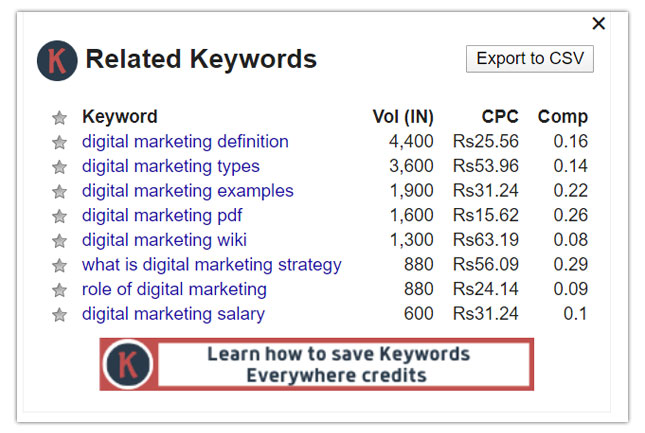
Related keywords generated by Keywords Everywhere Chrome extension
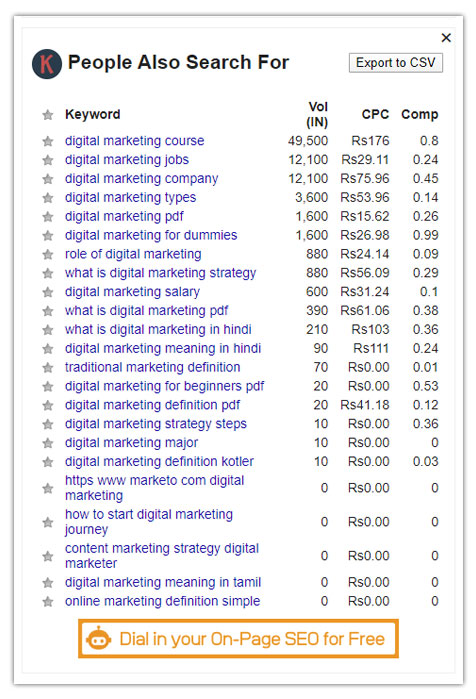
Related terms searched by users – shown by Keywords Everywhere browser extension
If you want to rely on a much comprehensive solution to find out long-tail keywords, you can check out Keyword Magic Tool by SEMrush. They are also offering a free 7-day trial in case you want to explore its powerful features.
Search intent behind keywords
After Google’s Hummingbird, RankBrain and recently the BERT update, they are focusing more on providing the right kind of search results to the users.
No matter what you search and how you search Google will make sure you are getting the right results.
So how does this impact when we do keyword research?
The answer is simple.
We need to focus more on the users’ intent behind their query and create content that is answering them well.
For example, if someone is searching for the term ‘top coworking spaces in New York’ they are certainly looking for coworking office spaces in New York city that are well-known.
But if you create a piece of content that mostly talks about the features of coworking spaces and try to target the keyword ‘top coworking spaces in New York’, that is not really matching the user intent behind that query.
Keywords can be classified into 4 types based on search intent.
i) Keywords with informational intent
ii) Keywords with navigational intent
iii) Keywords with commercial intent
iv) Keywords with transactional intent
Let me explain these keyword types to you in detail.
i) Keywords with informational intent
These are keywords used by people to gather information about something that they are interested in.
Keywords with informational intent can mainly include questions that users ask on Google.
Let’s look at a few examples.
- How many states are there in the US?
- Who is the president of Canada?
- How to prepare Kerala style fish curry?
When people type in such questions into the search engine, they are certainly looking for information. And some of these questions result in one-word answers, whereas some others may lead the user to bigger and more elaborate answers.
ii) Keywords with navigational intent
When users type in keywords with navigational intent, they already know where they want them to be taken.
For example, if I need to log-in to Twitter, I would obviously be typing in ‘twitter log-in’. And I expect the search results to take me to the log-in page.
Here are a couple of more examples.
- Amazon global store
- Google Search Console
Though you can write content and try targeting these keywords with navigational intent, mostly you will end up with no clicks even if you manage to rank on the first page.
This is because someone searching for Twitter log-in will click on that first result and go to the log-in page of Twitter, they don’t even try to look at other results on the first page of search results.
iii) Keywords with commercial intent (commercial investigation)
These are keywords used by people when they are planning to buy something, but not immediately. They could be using this type of keywords to weigh their options or to compare different products.
Below are some of the examples of commercial investigation.
- Best Bluetooth headset
- iPad vs. Samsung Galaxy tab
- Amazon Echo Dot review
This type of keywords work exceptionally well for bloggers and affiliate marketers where they create content around product reviews and comparisons.
iv) Keywords with transactional intent
These are the kind of keywords that people use when they are ready to buy. The intent behind the search is to make a purchase immediately.
Here are some of the sample keywords with transactional intent.
- Amazon Kindle offer price
- Buy iPhone X
- Wondershare Filmora coupon
These are the main 4 types of intent behind search queries. When you create content and optimize them for search engines, always make sure it matches with the user’s intent.
Well, there is a way to identify the intent match between your content and the keyword that you are planning to target.
Google that particular keyword and see all the results that are appearing on the first page of search results. There will be a specific pattern followed in most cases. (see image below)

For example, if the keyword has a transactional intent, all the search results will lead to sales pages or product pages where people can directly make a purchase. In such a scenario, you would certainly want to create a sales page to match the user intent, not a how-to article or a review page.
Hope this makes the concept of search intent more clear to you.
Monthly average search volume
This is one of the most important factors in deciding a target keyword.
You should try targeting keywords that are having a decent monthly search volume. Because if no one is searching for a particular term, what is the point of creating content or pages targeting that one keyword?
It is as simple as that.
Now, what is a good average monthly search volume for a keyword?
Well, there is nothing like a magic number. You can start from as low as 50 searches per month for a brand new website. This is because low search volume keywords are generally easy to rank for.
However, if your site is 1-2 years old, and is seeing some traffic, you can try targeting keywords that are having higher search volumes.
There are multiple tools that you can use to find out the search volume of keywords. But here are some of the popular ones that you can use.
- SEMrush Keyword Magic Tool (Get a Free 7 Days Trial Here)
- Google Keyword Planner
- Keywords Everywhere Browser Extension
- Ubersuggest by Neil Patel
I would also like to mention Google Trends, which is another tool that can show you some of the trending topics across the web. These trending topics or keywords will normally have a sudden increase in their monthly search volume. Google Trends can be used to find out trending keywords in your niche.
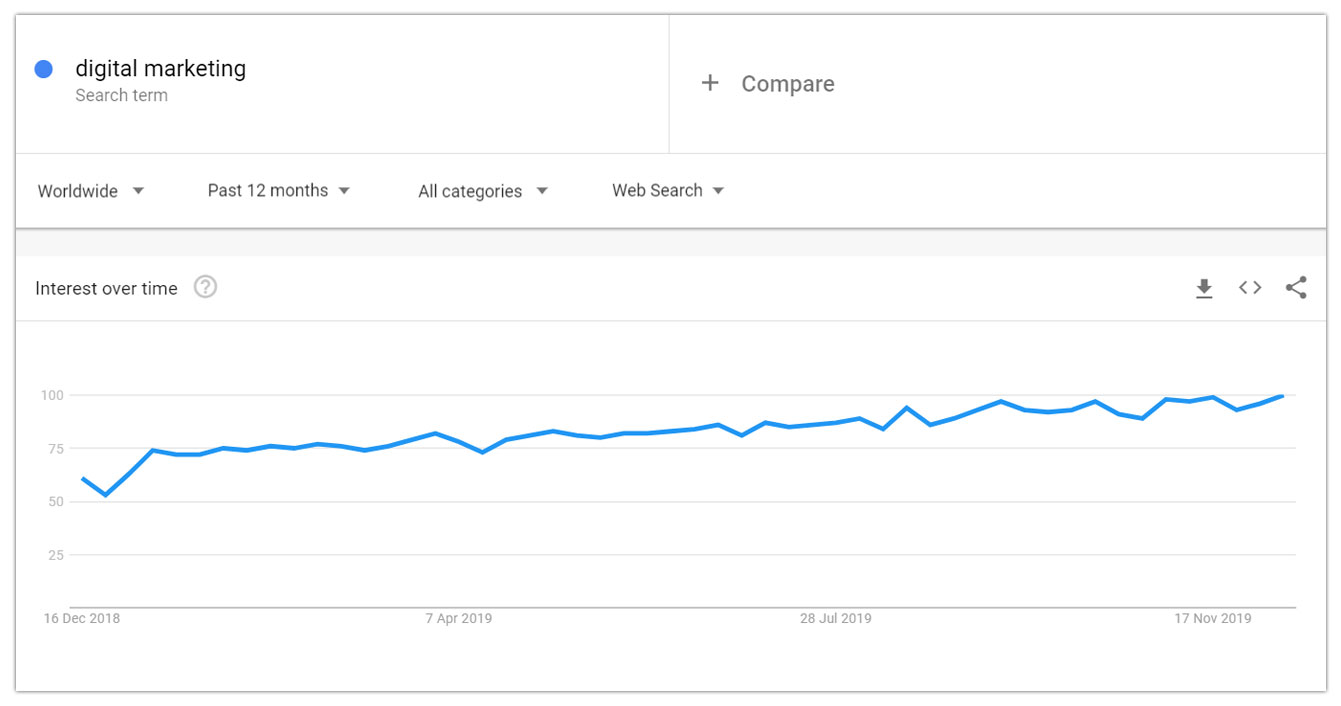
Google Trends showing the popularity of a search term

Google Trends showing related queries and topics.
Ranking difficulty/keyword difficulty
The ranking difficulty metric will tell you how easy or difficult it is to rank for a particular keyword. It is normally assessed on a scale of 1 to 100. A score of 1 will indicate the easiest keyword and a score of 100 will indicate a toughest keyword.
And please note, this metric can have various names depending on the keyword research tool that you are using. Ranking difficulty, keyword difficulty and SEO difficulty are all the same thing, just different names.
Ranking difficulty (SEO difficulty) for a keyword is mostly calculated based on the competing sites for that keyword. And this metric mainly looks at the domain score and backlinks to determine the strength of a competing website.
Basically, if your website is going to compete for a keyword with sites that are having good domain score and backlinks, it is going to be difficult to rank for that keyword.
You can make use of this tool called Ubersuggest to find out the SEO difficulty or ranking difficulty of a particular keyword. (see below image)
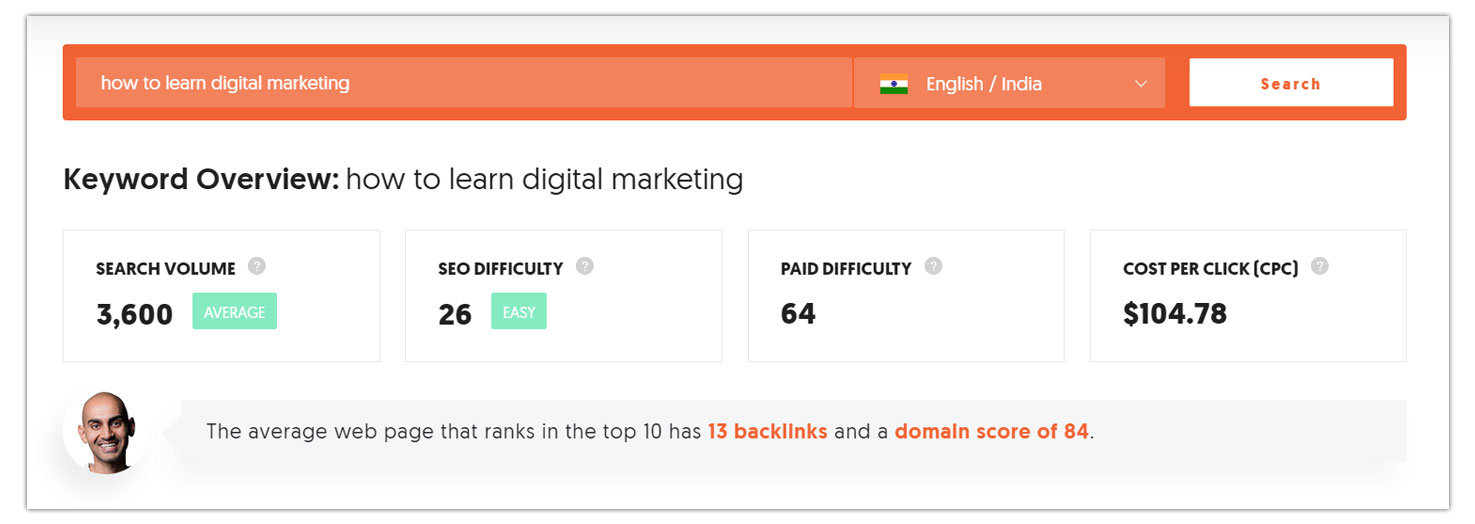
If you find the SEO difficulty on Ubersuggest to be less than or equal to 20, it is an easy keyword. It gets tougher to rank for a keyword when the SEO difficulty goes above 20.
However, all this will depend on your website’s backlink profile as well as your content quality.
Understand the buyer’s journey to find better keywords
Apart from all the points that we discussed above, this is one aspect that you need to focus on if you are doing keyword research for content creation.
It’s about understanding the concept of Buyer’s Journey and making use of it while doing keyword research.
Understanding the buyer’s journey and its different stages will help you pick the right keywords that align with each of these stages. Then you can use these keywords to craft content and target users in these different stages of the buyer’s journey.
I will tell you a bit about the concept of buyer’s journey first and then how you can pick the right keywords to match each stage of it.
So here we go.
Buyer’s journey as a concept describes the 3 stages (sometimes more than 3) that each customer will go through before making a purchase in the end.
These stages are awareness, consideration and decision. (see image below)
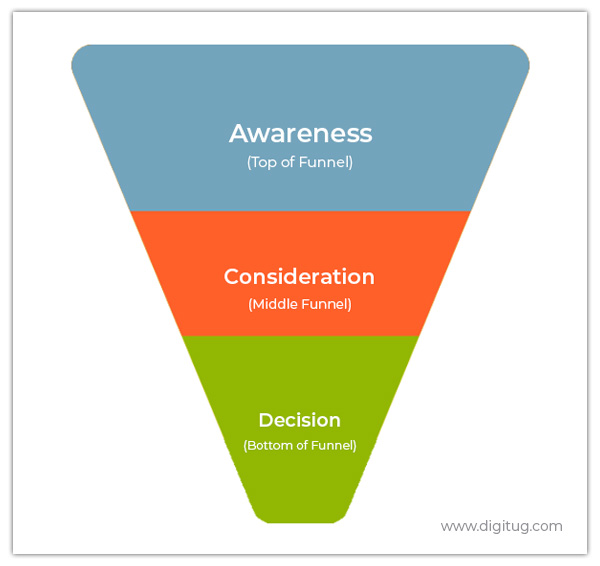
These 3 stages act like a funnel through which you will drive your customer towards your offer where they will make a purchase in the end. The purchase should ideally happen at the bottom of the funnel.
But before that, to take your customer through the 3 stages of buyer’s journey, you need to create content that fall into these 3 stages.
Normally it’s like this.
Awareness Stage: In this stage, your prospects are aware of a problem that they have. The content that you create here should help your users to find a solution to their problem.
Consideration Stage: In this stage, your prospects already know about a few solutions to their problem, and are just weighing their options. The content that you create here should help your target users to choose between multiple solutions to solve their problem.
Decision Stage: In this stage, your prospects would have already decided about getting a particular solution and they are looking for more information on it. The content that you create here should explain them more about the benefits of this particular solution and possibly drive them towards making a purchase.
Now, let’s look at how we can pick the right keywords to match each of these stages in your buyer’s journey.
Let me explain it with the example of ‘people who want to reduce weight without working out’.
This category of people will be mostly asking questions like ‘how to reduce weight without working out?’ On Google. This is a typical top of the funnel question (awareness stage) where they are looking for solutions to a problem.
Now, if you are creating content targeting your audience in the awareness stage and want to bring them inside your funnel, here’s what you need to do.
Pick keywords that align with the awareness stage of buyer’s journey, and create great content around these main keywords.
Let’s look at these examples.
- How to reduce weight quick?
- How to reduce weight without working out?
These are long-tail keywords (I’ve explained long-tail keywords in detail below) that fall into the awareness stage of buyer’s journey. Interestingly, most of these questions directly make competitive long-tail keywords without much modifications.
You might also notice that these keywords fall into the informational intent category that we discussed above. This is because users in the awareness stage are always looking for solutions or information that can solve their problems.
In the same way, you can find keywords that match the consideration and decision stage of buyer’s journey.
Here are a few examples.
Consideration stage:
- Does green tea cause weight loss?
- Green tea and paleo diet
- Paleo diet and weight loss
Decision stage:
- Best green tea brands
- Buy green tea online
- Green tea offer price
To make this process of finding keywords easier, you can make a list of keywords that you want to target and classify them into 3 groups based on the buyer’s journey stages.
Once you have made these 3 categories, you will be able to use these keywords effectively in your content that align with your buyer’s journey.
Conclusion
I have tried to cover all the important aspects of keyword research in this article.
To summarize, always go for long-tail keywords that match the user intent well.
And look for the search volume and SEO difficulty using a tool like SEMrush or Ubersuggest.
Hope this guide turns helpful in finding some of the best keywords for your website’s SEO.
Got any queries or feedback?
Leave a comment below, I would be happy to help.

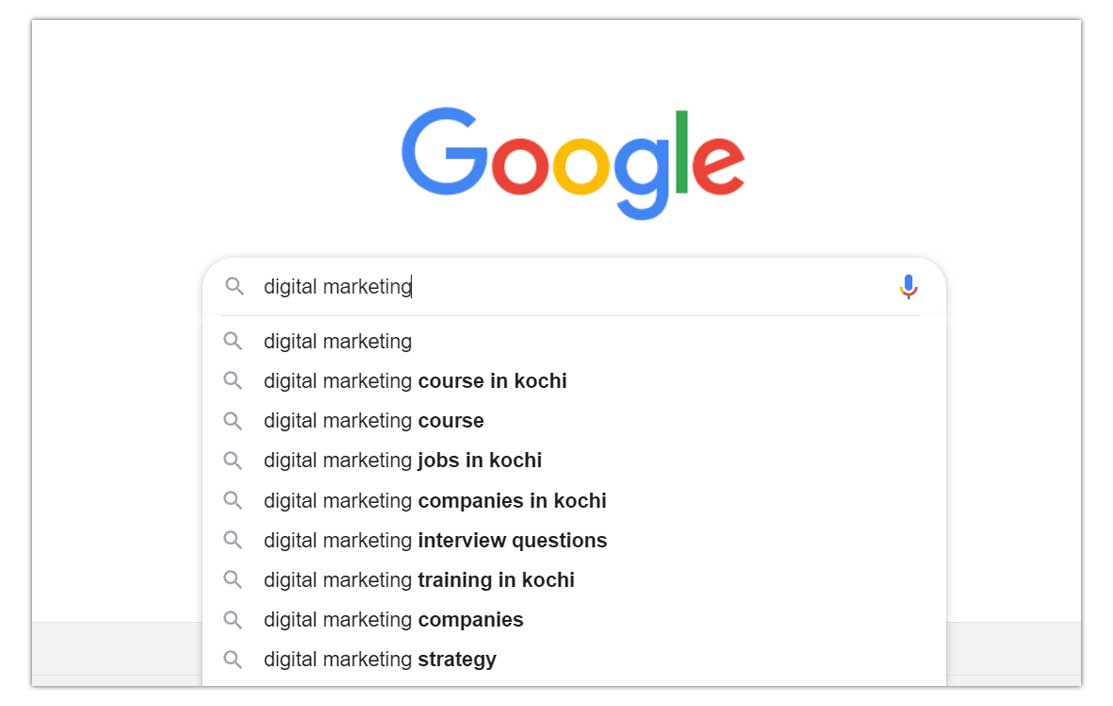
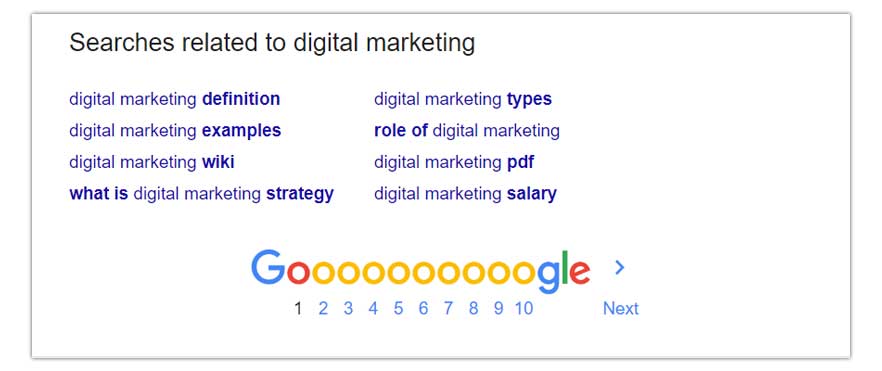
Fam
I find this blog really simple and well explained.Thank you